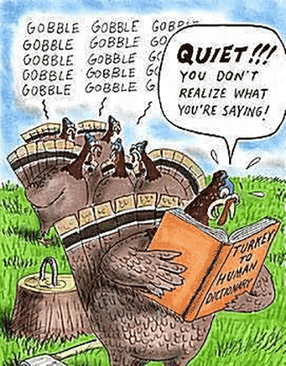
There seems to be no better time than now to examine the phrase “talk turkey.” It is, after all, that time of year. In short, the phrase “talk turkey” usually means “to speak frankly,” though this time of year it’s more likely to be a discussion of how to cook the bird.
People might not use it as often if they realized its derivation seems to be white settlers in North America cheating Native Americans.
According to the Columbia Journalism Review, the first recorded use of “talk turkey” was in 1824. While the origin story has several machinations, and no one is sure any of them are true, the common explanation goes like this:
A white man went hunting with a Native American, and they bagged some turkeys as well as some less desirable birds, possibly buzzards or crows. According to The Dictionary of American Slang, the white man said something like, “You take the crow and I’ll take the turkey, or I’ll take the turkey and you take the crow,”
In other words, the white man was intent on keeping the good bird. The Native American supposedly replied, “You’re not talking turkey to me.”
A version of this story was repeated in 1837, in Niles’ Weekly Register, “…containing political, historical, geographical, scientifical, statistical, economical, and biographical documents, essays and facts.” One of the most widely circulated magazines in the United States during the time, it may be responsible for spreading that story — right or wrong.
The earliest uses of “talk turkey,” whatever its origin, involved talking to someone pleasantly but directly.
So, during this holiday season, where “fake news” is, unfortunately, de rigueur, let’s talk turkey to each other.
